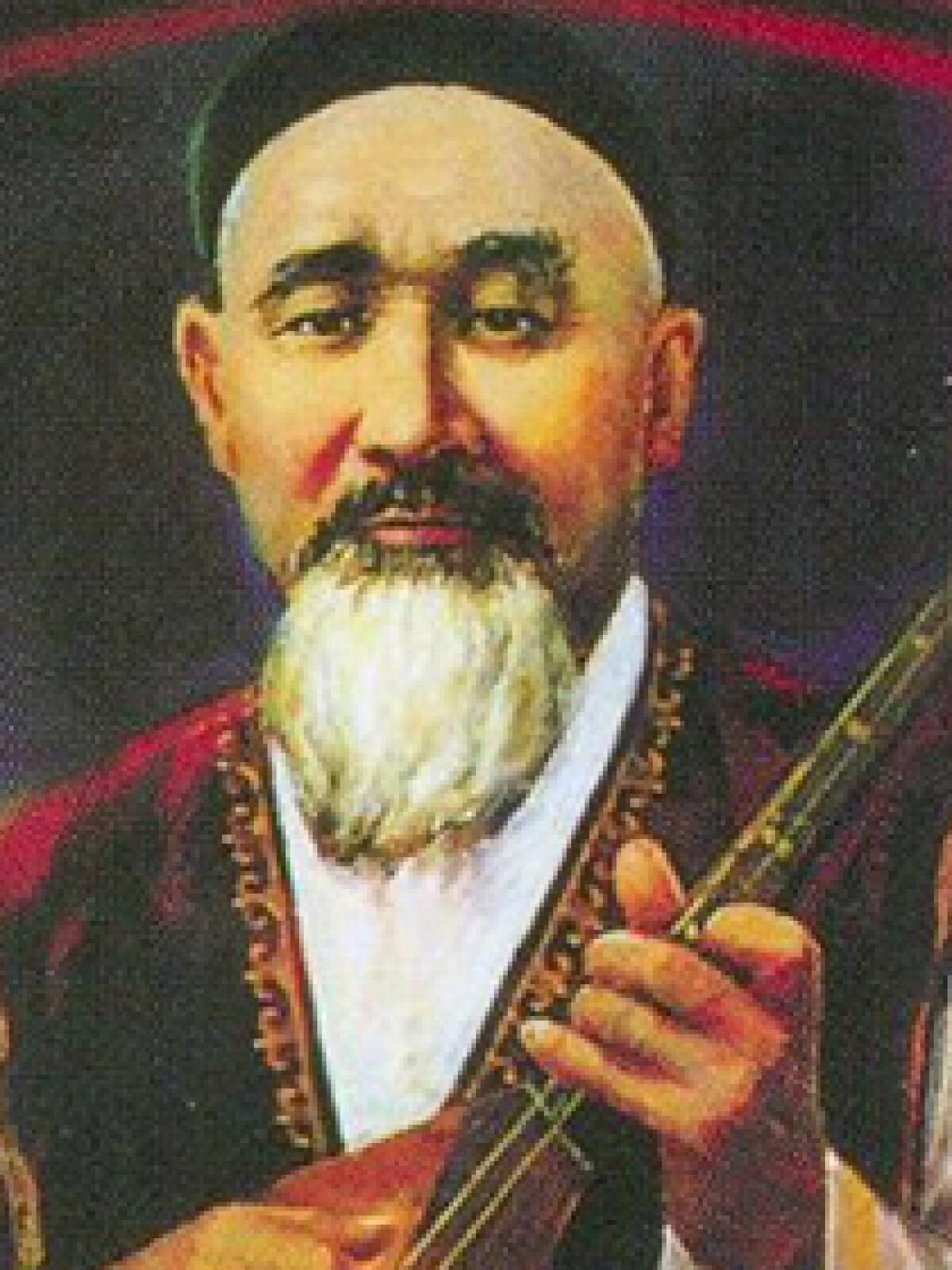Bukhar-zhyrau
Bukhar-zhyrau Kalkaman Uli (1693–1789) was a Kazakh poet at the court of the Middle Orda. His period of activity at the court lasted from 1711 until 1781, during the reign of the Abylay Khan. Although his primary activity was entertaining the court through poetry and singing, Bukhar-zhyrau also acted as an advisor to the Khan. Because of this, his poetry dealt with broader themes which included politics, the foreign policy of the horde, and the life of the Khan. Bukhar-zhirau is not known to have written any epics.
Bukhar-zhyrau Kalkamanuly was a Kazakh akyn (poet), zhyrau (poetic singer), and the prominent representative of the Kazakh oral poetic creativity. Bukhar-zhyrau was born in 1668 in the Bayan aul in Suykhar-Niya town, died in the same place in 1781. According to the main researcher of his life and creativity Mashkhur - Zhusup Kopeev, the collector of zhyrau, Bukhar occurs from Argyn dynasty, Bukhar’s ancestors were progenitor, and the father of Bukhar was Kalkaman batyr.
Bukhar’s social active vital position testifies that being young he was a judge (biy). His authority also testifies the fact that he participated in drawing up of the code of laws of Tauke khan "Zhety zhargy" together with Kazybek bi, Tole bi and Ayteki bi. The native of the people Bukhar “became a khan from grass-roots”, "from black became light" thanks to valor and eloquence, being considered as the most influential biy of the era.
The phenomenon of Bukhar-zhyrau is his word which has mentioned the deepest vital strings of national thickness and consequently became effective. To be or not to be – that was the question they faced. The Dzhungars attacked the Kazakh land as tornado destroying all signs of life on the way. On the other side there were two giants - Russia and China. The vice which has surrounded the Kazakh steppe was really steel. But the internal enemy of people was the most terrible - prospering cowardice, weakness, a dissimulation, desire to run from the enemy and from any problems combined with the small clan interests which have won a patriotic duty.
The golden page in life of the Kazakh people is a meeting of Bukhar-zhyrau with the khan Ablay. During ther era of Bukhar when the Kazakh state weakened and broke up to parts Ablay was the strongest governor among the Kazakh khans. He wanted to unite all three zhuzes in the uniform mighty centralized state. Bukhar with a surprising insight guessed Ablay’s genius, having sincerely believed in him. Ablay for his part saw the deep thinker in this poet the true singer of the people, the spokesman of his thoughts and expectations.
In this creative commonwealth the sense of policy and diplomacy of Ablay reveals. Khan Ablay appreciated in Bukhar not only his eloquence and knowledge of "common law". Probably Ablay respected so much and even afraid of Bukhar because of his prophetic songs opening to people the future. Bukhar predicted Ablay routes and happy days of military campaigns interpreted his dreams. Ablay knew the price both to eloquence, knowledge and diplomatic abilities of his zhyrau, he resorted to services of Bukhar wishing to improve the relations with the dynasties which has left from under his power. Bukhar was called "Komeky aulie" - a sacred throat. Nobody else neither among predecessors, nor among contemporaries of Bukhar was called so. His gift of poetic improvisation considered prophetic.
Since the childhood Bukhar was the deaf-mute. Once, when the boy was 7 his parents left on funeral of the relative. In an empty aul, having approached to a place of milked filly Bukhar got to the tornado. Twisted by flaw he began to sing and the song poured down from his lips unceasingly. The deaf-mute heard and started talking, started talking verses.
The word of Bukhar is powerful and wise. Thanks to his songs we can see the live process of deployment of history. In the poem "Sabalak" the celebration of declaration of Ablay the khan that was in 1734 is described. The influence of Bukhar on the khan was so great that the khan policy in many respects depended on Bukhar. He advised Ablay not to be at war with Russia, to be careful with Chinese armies. Bukhar called Ablay "generous Ablay" (Ken Ablay), my support, he saw in him the khan around whom the people could stick together, collecting the Kazakh militia, making military campaigns and enriching citizens with spoils of war. Ideas of patrimonial unity develop in songs of Bukhar in idea of all citizens of Ablay, it means unity of the state. He wants the khan to take care of the people and recognition by the people of the khan.
Bukhar is a splinter of the era and at the same time a mirror of social life of that time. He was not knocked down by daily life, and urged Kazakhs to think of that people live not by one matter. "Do not plunge yourself into infinite lawsuits for cattle, for the land, the cattle can be lost, the land remains after you" – Bukhar-zhyrau appeals to his tribesman. He managed to absorb the richness of oral creativity that it is possible to consider him as one of ancestors of the Kazakh literature.
Batyrs put forward during the era of Ablay and become his companion-in-arms, honored Bukhar as the great person and the ideological inspirer. Calling for unity, preaching solidarity Bukhar acted as a patriotic poet. Bukhar-zhyrau helped the Kazakh people to pass one more piece of a way to national consciousness thanks to his wisdom and inspired verses. Early records of Bukhar’s works exist as the records of 1880 from Kurmanbay, the grandson of Bukhar.
Share:









